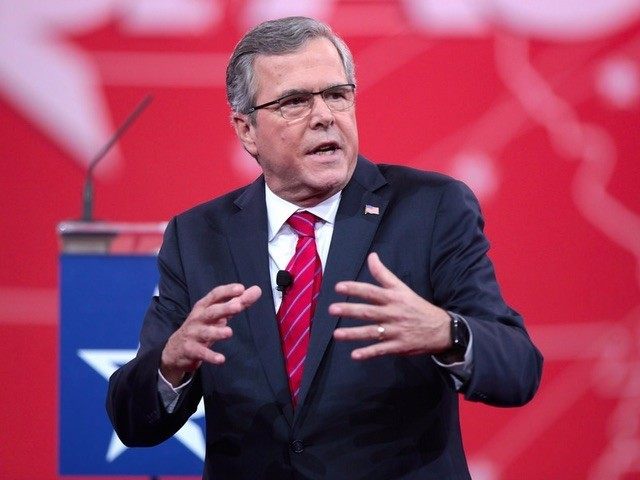If “money is the mother’s milk of politics,” as the late Jesse Unruh said, Jeb Bush is in the process of building the biggest dairy farm in American political history.
Pundits are debating whether Bush’s new Super PAC will succeed in raising $100 million on his behalf before he formally announces his candidacy for the Republican nomination for President. They’re also concerned with how long he will delay that announcement while he’s raising the money. But the electoral fight may well hinge on something far more important.
Will Republican primary voters buy what he’s selling, regardless of how many times they hear the message?
Bush is already singing a tune that’s off key to most conservatives on two key issues: amnesty for illegal aliens and Common Core education standards.
The former Florida governor, son of one president and brother of another, may be able to use the big funding that’s flowing into his Right to Rise Super PAC, just formed on January 5, 2015, according to FEC records, to change the minds of primary voters on those issues or change the topic enough to clobber his primary opponents.
But that messaging battle may be complicated if Bush’s focus on fundraising slows up his formal announcement. It could give expected rivals (Walker, Paul, and Cruz) a leg up, as all three are widely expected to announce their candidacies as soon as next month.
But the political pundits, who are already buzzing about how much the new group will report having raised when the first quarter 2015 reports are due on April 15, are not sure the third member of George H. W. Bush’s immediate family to try for the nation’s top political office has the common touch it takes to follow the political successes of his father and brother.
Middle class Republican voters were able to identify with his patrician father and fraternity friendly brother. But for the youngest Bush, the only voters who really seem enthused about his candidacy are the high dollar donors on Wall Street.
Bush’s Super PAC’s sparse website does not look as if it’s geared up to raise money from small dollar donors. The home page offers a title, an image of an American flag, a place to give your email address, and a link to a donation page, which helpfully reminds visitors there is no limit on the amount that can be donated to Mr. Bush’s Super PAC.
That this is a bit of an inside media game is made clear with how the story rapidly evolved this week.
Politico’s Ben White got things rolling with a piece that framed the expectation narrative. If Bush did not reach the $100 million goal, his efforts might be seen as a failure.
Bush’s political consultants pushed back.
“The whispers in the air are not at all accurate. The PAC’s goals are far more modest,” Tim Miller, a spokesperson for Bush’s Super PAC, responded.
Later in the day, White moved the story forward with a few qualifications at CNBC, another media outlet where he hangs his hat. (The story, originally published on Friday, now includes Monday’s developments.)
It’s the sort of rapidly moving media narrative you often see in Washington these days, but as with many things coming out of our nation’s capital recently, it may well miss the point entirely.
As White framed the story at CNBC:
“He [Bush] is literally vacuuming up cash everywhere he goes,” one financial services industry executive said to me this week. “So $100 million or more wouldn’t surprise me.” Others who have gone to Bush events made similar comments, saying initial speculation of up to $70 million sounded low.
But the fact that people are talking this way illustrates a problem for Bush. He now carries the expectations of a perceived front-runner whose biggest advantage at this early stage is the ability to raise vast sums of money from the GOP establishment.
But out on the hustings in Iowa, New Hampshire and South Carolina, Republican voters may not care very much whether Bush’s Super PAC raises $70 million or $100 million before he formally announces.
Curiously enough, they may care more about whether they agree with Bush’s policies.
No amount of money would save a candidate who is out of touch with the core values of Republican primary voters.
Inside the Beltway, pundits believe Bushy’s apparent plan to delay his announcement as long as needed to raise $100 million for his Super PAC to be a high-risk high-reward strategy.
Outside the Beltway, Republican primary voters are more likely to believe his efforts to financially brow beat them and his opponents with policies they don’t support is the real high-risk strategy, one whose high-rewards may well fall short.

COMMENTS
Please let us know if you're having issues with commenting.